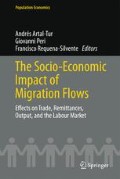Abstract
Brain drain is a major issue for Small Island Developing States (SIDS). Econometric analysis confirms that smallness has a strong positive impact per se on emigration rates. On average, 50 % of the high-skilled labour force in SIDS has left their country, and the brain drain exceeds 75 % in a few cases. In this paper, we document this phenomenon and study the bi-directional links between brain drain and development. We show that these interdependencies can be the source of multiple equilibria and that small states are much more likely to be badly coordinated than other developing countries and settle in a bad equilibrium. The reason is that their elasticity of emigration to economic performance is larger. After calibration, we identify an important number of badly coordinated SIDS and quantify the economic costs of coordination failure. These costs may exceed 100 % of the observed GDP per capita. Badly coordinated small states require appropriate development policies aimed at retaining or repatriating their high-skilled labour force.
Access this chapter
Tax calculation will be finalised at checkout
Purchases are for personal use only
Notes
- 1.
An open trade regime might, under certain conditions, help partly overcome negative aspects of smallness, namely the limited opportunity of creating economies of scale.
- 2.
The regressions where only one political variable is deleted are not shown but the results hold in those cases as well, i.e., the political variables do not constitute robust determinants of high-skilled migration.
- 3.
Although it is made for mathematical simplicity, this assumption is in line with many empirical studies advocating to use a high elasticity of substitution to match data on the skill premium in developing countries.
References
Alesina A, Devleeschauwer A, Easterly W, Kurlat S, Wacziard R (2003) Fractionalization. J Econ Growth 8(2):155–194
Barro RJ, Lee JW (2001) International data on educational attainment: updates and implications. Oxf Econ Papers 53(3):541–563
Beine M, Docquier F (2008) Measuring skilled emigration rates: the case of small states. IZA Discussion Paper n. 3388
Beine M, Docquier F, Rapoport H (2008a) Brain drain and human capital formation in developing countries: winners and losers. Econ J 118:631–652
Beine M, Docquier F, Schiff M (2008b) Brain drain and its determinants: a major issue for small states. IZA Discussion Paper n. 3398
Chiswick BR, Miller PW (1995) The endogeneity between language and earning: an international analysis. J Lab Econ 13(2):246–288
Cohen D, Soto M (2007) Growth and human capital: good data, good results. J Econ Growth 12(1):51–76
de la Croix D, Docquier F (2012) Do brain drain and poverty result from coordination failures? J Econ Growth 17(1):1–26
de la Fuente A, Domenech R (2006) Human capital in growth regressions: how much difference does data quality make? J Eur Econ Assoc 4(1):1–36
Docquier F, Lowell LB, Marfouk A (2009) A gendered assessment of highly skilled emigration. Popul Dev Rev 35(2):297–322
Grogger J, Hanson G (2011) Income maximization and the selection and sorting of international migrants. J Dev Econ 95(1):42–57
Kaufmann D, Kraay A, Mastruzzi M (2005) Governance matters III: governance indicators for 1996–2002. The World Bank, Washington, DC
Lopez R, Schiff M (1998) Migration and the skill composition of the labor force: the impact of trade liberalization in LDCs. Can J Econ 31(2):318–336
Lucas RE (1988) On the mechanics of economic development. J Monet Econ 22(3):3–42
Mayda AM (2010) International migration: a panel data analysis of the determinants of bilateral flows. J Popul Econ 23(4):1249–1274
Mayer T, Zignago S (2011) A note on CEPII’s distances measures. CEPII Working Paper 2011-25
Rotte R, Vogler M (2000) Effects of development on migration: theoretical issues and new empirical evidence. J Popul Econ 13(3):485–508
Rosenzweig MR (2008) Higher education and international migration in Asia: brain circulation. In: Lin JY, Pleskovic B (eds) Higher education and development, Proceedings of the annual world bank conference on development economics. The World Bank, Washington, DC
Author information
Authors and Affiliations
Corresponding author
Editor information
Editors and Affiliations
Rights and permissions
Copyright information
© 2014 Springer International Publishing Switzerland
About this chapter
Cite this chapter
de la Croix, D., Docquier, F., Schiff, M. (2014). Brain Drain and Economic Performance in Small Island Developing States. In: Artal-Tur, A., Peri, G., Requena-Silvente, F. (eds) The Socio-Economic Impact of Migration Flows. Population Economics. Springer, Cham. https://doi.org/10.1007/978-3-319-04078-3_6
Download citation
DOI: https://doi.org/10.1007/978-3-319-04078-3_6
Published:
Publisher Name: Springer, Cham
Print ISBN: 978-3-319-04077-6
Online ISBN: 978-3-319-04078-3
eBook Packages: Business and EconomicsEconomics and Finance (R0)

